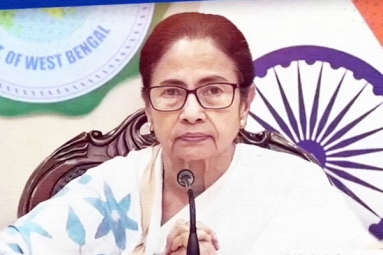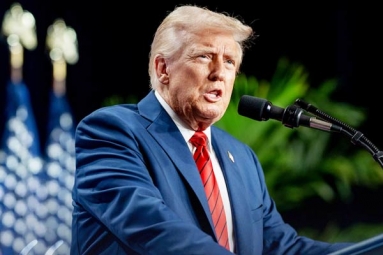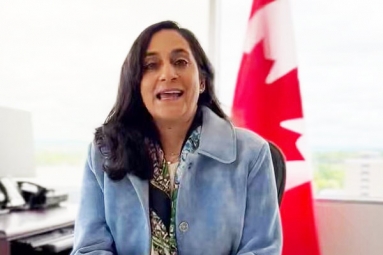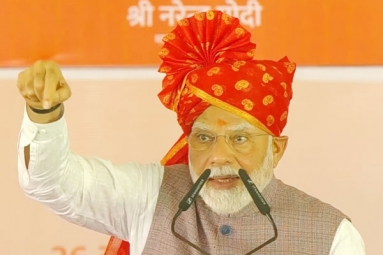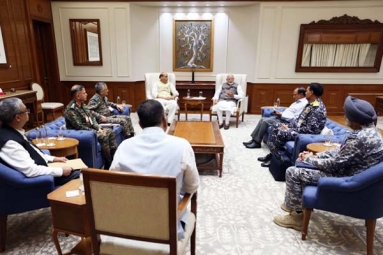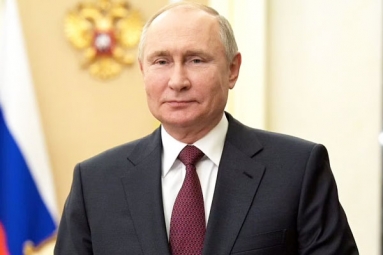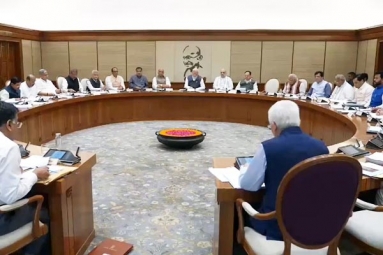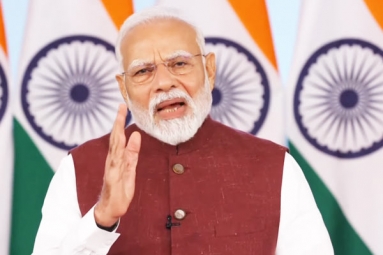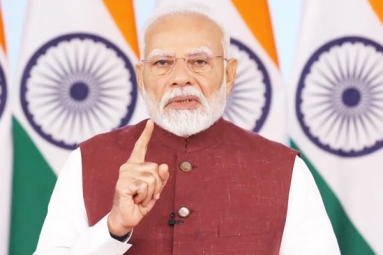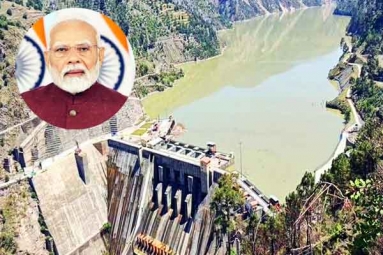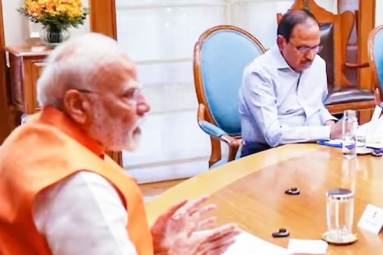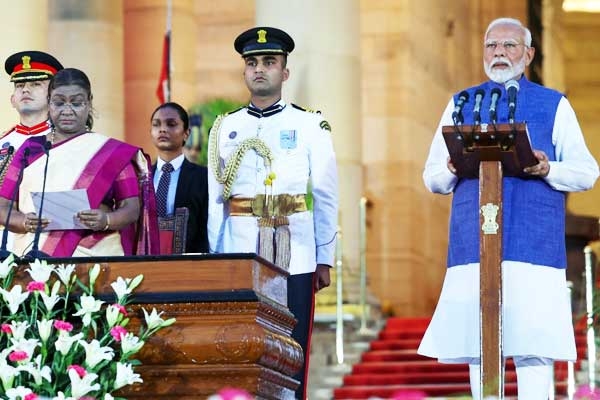
(Image source from: x.com/narendramodi)
Prime Minister Narendra Modi was sworn in for his third consecutive term on Sunday, along with 71 other members of his Council of Ministers, during a ceremony held at Rashtrapati Bhavan. The Union Council of Ministers, which can have up to 81 members, saw a substantial cohort of 72 individuals taking the oath, showcasing a coalition government that emphasizes both continuity and change. Notably, the government has given substantial representation to its allies in the National Democratic Alliance (NDA), with 11 portfolios allocated to them. Among the Cabinet ministers sworn in were former Chief Ministers from Karnataka and Bihar, including H.D. Kumaraswamy of the Janata Dal (Secular), Jitan Ram Manjhi of the Hindustan Awam Morcha (HAM), Chirag Paswan of the Lok Janshakti Party, Ram Mohan Naidu of the Telugu Desam Party (TDP), and Rajeev Ranjan Singh "Lallan" of the Janata Dal (United). Additionally, Jayant Chaudhary of the Rashtriya Lok Dal and Pratap Rao Jadhav of the Shiv Sena were appointed as Ministers of State with independent charge. The government also included Anupriya Patel of the Apna Dal, Ram Nath Thakur of the JD(U), Chandrashekhar Pemmasani of the TDP, and Ram Das Athawale of the Republican Party of India as Ministers of State.
The Congress Party was not granted any seats in the new government. They were offered a junior ministerial role, but the party chief, Ajit Pawar, says they will wait for a more senior cabinet position. The All Jharkhand Students Union (AJSU) also did not receive any representation. The new Council of Ministers is composed of members from 24 different states, including the BJP's first Lok Sabha MP from Kerala, Suresh Gopi. The selection reflects a diverse range of castes and communities, with 27 ministers from the Other Backward Classes, 10 from Scheduled Castes, 5 from Scheduled Tribes, and 5 from minority groups. Additionally, 10 ministers have served in the government for the past 10 years, including experienced figures like Rajnath Singh, Nitin Gadkari, Nirmala Sitharaman, and Piyush Goyal. The new administration emphasizes continuity and experience, with 43 members being third-term MPs and 39 having previous ministerial experience. Former state chief ministers, such as Shivraj Singh Chouhan, Manohar Lal Khattar, and Sarbananda Sonowal, have also found representation in the government.
Congratulations to all those who have taken oath today. This team of Ministers is a great blend of youth and experience, and we will leave no stone unturned in improving the lives of people. pic.twitter.com/3PK3l1hG5p
— Narendra Modi (@narendramodi) June 9, 2024
The upcoming Assembly elections in Maharashtra, Haryana, and Jharkhand were at the forefront when forming the new Council. The inclusion of Mr. Khattar, a close ally of Prime Minister Narendra Modi, six-time MP Rao Inderjit Singh, and veteran Gurjar leader Krishan Pal Gurjar, who secured a third term in Faridabad, reflects the BJP's focus on maintaining its hold over southern Haryana and the non-Jat voter base in the agrarian state. The BJP had previously won five out of the 10 Lok Sabha seats in Haryana. From Maharashtra, seasoned leaders Nitin Gadkari and Piyush Goyal were reappointed to the new Union cabinet, ensuring representation for the Vidarbha and Konkan regions, while Raksha Khadse, a three-term MP from Raver in Jalgaon, and the newly elected Pune MP Murlidhar Mohol, will make their debut as Central Ministers. The Shiv Sena's Prataprao Jadhav, a Maratha leader who emerged victorious in Buldhana's Vidarbha constituency for the fourth time, was selected by party chief and State CM Eknath Shinde to represent his faction in the Council of Ministers. In terms of caste representation, no senior Maharashtra OBC leader, a crucial vote bank for the BJP in the state, is included in the Council; Mr. Gadkari's appointment as a Brahmin serves to balance the representation.
The Cabinet now reflects the diversity of India's population. Mr. Jadhav hails from the Maratha community, while Ms. Khadse belongs to the Teli community. The losses of Pankaja Munde from Beed and Rao Saheb Danve have been addressed in the new appointments. In Jharkhand, the BJP has included Annapurna Devi, an OBC leader from Koderma, and Sanjay Seth, a member of the trading community from Ranchi. These selections cater to important voter segments for the party. The BJP's performance in Uttar Pradesh was a cause for concern, leading to the inclusion of nine new members, including Prime Minister Narendra Modi. The focus has been on maintaining continuity and ensuring the right caste representation to make up for the previous election losses. Familiar faces like Rajnath Singh, Prof. S.P.S. Baghel, Pankaj Chaudhary, B.L. Verma, and Anupriya Patel of the Apna Dal (Sonewal) have retained their positions. The new additions include Jitin Prasada, Kamlesh Paswan, Kirti Vardhan Singh, and the RLD's Mr. Chaudhury, all of whom bring diverse backgrounds and experiences to the table. The diverse group included individuals from various social backgrounds, such as non-Jatav Scheduled Castes and a Brahmin representative, reflecting the inclusive nature of the gathering.
(Video Source: Bharatiya Janata Party)





